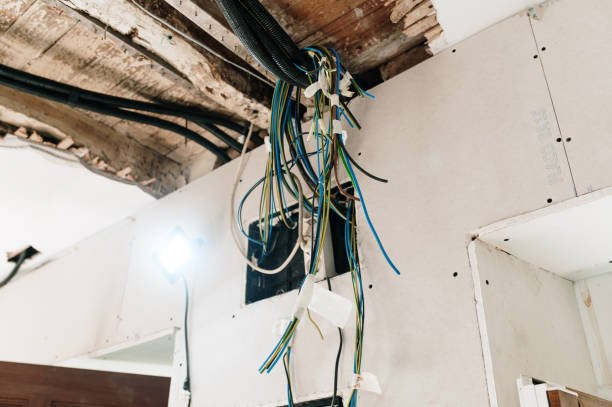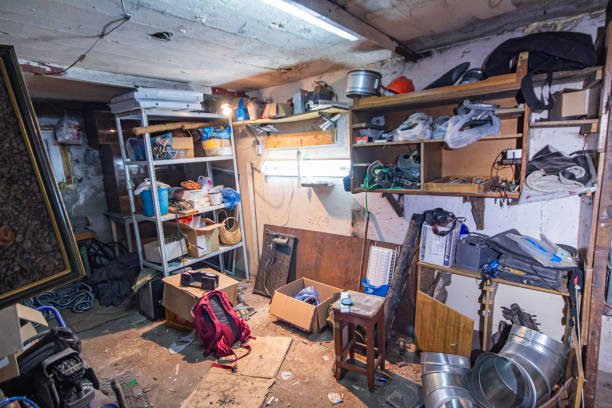
Rewiring a House in the UK – Complete Cost Guide, Process & Tips (2025)
Rewiring a house is one of the most significant electrical improvements you can make to your UK home. With aging electrical systems in many British properties dating back decades, a full house rewire isn’t just about modernizing—it’s about safety, efficiency, and peace of mind.
The UK’s housing stock features millions of homes with electrical systems that no longer meet current regulations. In fact, according to Electrical Safety First, about 4.2 million homes in the UK have electrical installations that are over 50 years old. Outdated wiring doesn’t just struggle to handle modern power demands—it poses serious risks including electrical fires and shocks.
This comprehensive guide will walk you through everything UK homeowners need to know about home rewiring, from recognizing when it’s necessary to understanding house rewiring costs, regulations, and finding qualified electricians in your area.
Table of Contents
When Should You Rewire Your House?

Before diving into the electrical rewiring process, it’s important to identify whether your home actually needs this substantial work. Here are clear indicators that your electrical system may be due for a complete overhaul:
Signs Your House Needs Rewiring
Age-Related Warning Signs
- Your property is over 25-30 years old with no record of electrical rewiring
- You have old-style round pin sockets or black rubber cables instead of modern PVC-coated wiring
- Fabric-covered cables are present (common in pre-1960s houses)
- Your fuseboard has wooden backing or cast iron switches
- No RCD (Residual Current Device) protection in your consumer unit
Performance Issues Indicating Rewiring Needs
- Frequent tripping of circuit breakers or blowing fuses
- Flickering or dimming lights when using appliances
- Buzzing sounds from sockets or switches
- Burning smells near electrical outlets or fixtures
- Discolored sockets or switch plates (browning or scorching)
- Mild electric shocks when touching appliances or switches
- Insufficient sockets, leading to overreliance on extension leads
Safety Concerns for Old House Rewiring
If you’re experiencing any of these issues in your old property, arrange for a qualified electrician to conduct an Electrical Installation Condition Report (EICR). This professional inspection will determine whether a house rewire is necessary or if smaller repairs might suffice.
Read: House Wiring Colours UK: Complete Guide to Electrical Cable Colours
Cost of Rewiring a House in the UK (2025)

The rewiring cost UK homeowners face varies significantly based on property size, location, complexity, and accessibility factors. Here’s a breakdown of current average house rewire costs:
Average House Rewire Cost by Property Size
| Property Type | Estimated Cost Range | Notes |
|---|---|---|
| 1-Bedroom Flat | £2,000 – £3,900 | Lower end for unoccupied properties; higher end for occupied ones. Your Property Wizard |
| 2-Bedroom Flat | £3,000 – £4,800 | Costs may increase in London and Southeast regions. Your Property Wizard |
| 3-Bedroom Flat | £3,800 – £5,800 | Larger flats with more rooms may be at the higher end of the range. Checkatrade |
| 1-Bedroom House | £4,200 | Average cost; actual prices may vary based on specific requirements. Checkatrade |
| 2-Bedroom House | £3,000 – £4,800 | Terraced houses may be on the lower end; detached houses on the higher end. Your Property Wizard |
| 3-Bedroom House | £4,000 – £6,225 | Semi-detached houses typically fall within this range. Checkatrade |
| 4-Bedroom House | £5,500 – £7,730 | Detached houses with more complex layouts may incur higher costs. Checkatrade |
| 5-Bedroom House | £7,500 – £12,500 | Larger properties with extensive wiring needs are at the higher end. Checkatrade |
What Affects Home Rewiring Costs
Several factors influence the final price of your rewire house estimate:
- Property location: London and Southeast England typically command premium rates
- Property age and condition: Older properties often have challenging access issues
- Number of sockets and light fittings: Modern requirements typically include more points than older installations
- Desired electrical features: Smart home systems, garden electrics, or special installations add cost
- Accessibility: Limited access to voids, tight spaces, or lofts increases labor time
- Occupancy during works: Working around occupants takes longer than empty properties
- Quality of materials: Premium switches, sockets and cables cost more
- Consumer unit specification: Basic units start around £300, while high-specification units with surge protection can exceed £600
Additional Costs to Consider for Full House Rewire
Beyond the basic rewiring costs, budget for:
- Redecorating after rewiring (plastering, painting, wallpapering)
- Replacing damaged flooring or carpets
- Alternative accommodation during the most disruptive phases
- Waste removal and cleanup services
- Inspection and certification fees
Getting Value for Money on Electrical Rewiring
For best value when planning your house rewire:
- Get at least three detailed quotes from house rewiring specialists
- Consider combining rewiring with other home improvements
- Plan rewiring before moving in or during other renovations
- Be clear about specifications and expectations
- Never choose solely on price—quality and safety should be paramount
Full House Rewiring Process Step-by-Step

Rewiring a house is a major undertaking that involves several stages. Understanding the process helps you prepare for the disruption and make informed decisions.
1. Initial Assessment and Planning
A qualified electrician will:
- Assess your current electrical system
- Discuss your electrical needs and usage patterns
- Create a plan for socket placement, lighting circuits, and special installations
- Develop a wiring diagram showing circuit layouts
- Schedule the work to minimize disruption
2. Preparation Work
Before the main rewiring begins:
- Furniture may need to be moved or covered
- Floorboards and potentially some walls will need to be lifted/opened
- The property should be cleared as much as possible of valuables and sensitive items
3. First Fix Phase
This phase occurs before plastering or when walls/floors are exposed:
- Old wiring is removed (if applicable)
- New cabling routes are established
- Cables are run through walls, floors, and ceilings
- Back boxes for sockets and switches installation are fitted
- All wiring is brought back to where the consumer unit will be positioned
4. Second Fix Phase
After plastering and decorating:
- Face plates for sockets and switches are fitted
- Light fittings are connected and installed
- Consumer unit replacement (fuseboard installation) is completed
- All circuits are properly terminated at the consumer unit
5. Testing and Certification
- Each circuit is thoroughly tested for safety and functionality
- System is certified with appropriate electrical certificates
- Homeowner receives necessary documentation including:
- Electrical Installation Certificate
- Building Regulations notification
- Circuit diagrams and testing results
How Long Does House Rewiring Take?
The house rewiring time varies by property size:
| 🏠 Property Type | ⏳ Estimated Duration | 🔧 Rewiring Notes |
|---|---|---|
| 1–2 Bedroom Flat | 4 – 7 days | Quicker access; fewer rooms and circuits to rewire |
| 3-Bedroom House | 7 – 10 days | Standard family homes; includes kitchen, bathroom, and more |
| 4+ Bedroom House | 10 – 15 days | Larger layout; more sockets, lighting points, and cabling work |
These are estimates for unoccupied properties; occupied homes may take 30-50% longer as electricians work around your daily routine.
Is Rewiring a House Messy?

Many homeowners ask if rewiring a house is messy. The honest answer is yes—a full house rewire creates significant disruption. The process typically involves:
- Lifting floorboards to access joists and run cables
- Creating channels in walls (chasing) for new wiring routes
- Dust from cutting into plaster and floorboards
- Multiple tradespeople working throughout the property
- Periods without electricity in different areas
- Temporary lighting and power arrangements
However, professional house rewiring specialists can minimize disruption through:
- Careful planning and sequencing of work
- Dust containment measures
- Clear communication about timelines
- Targeted approaches like rewiring house without removing walls where possible
- Daily cleanup procedures
To manage the disruption:
- Create a dust-free zone in at least one room
- Use plastic sheeting to protect furniture and fittings
- Establish a clear communication routine with your electrician
- Plan for periods without power or lighting
- Consider temporary accommodation during the most intensive work
UK Electrical Regulations and Legal Requirements

Understanding the legal requirements for house rewiring UK regulations is essential for a compliant installation.
Building Regulations Part P
All electrical work in UK dwellings must comply with Building Regulations Part P, which states that:
- Electrical installations must be designed and installed to provide reasonable protection against injury from electric shock, fire, burns, or injury arising from mechanical movement
- Certain electrical work must be notified to local authorities before commencement
- Work must be carried out by a competent person
Notifiable Work
Work that must be reported to local building control includes:
- Installing a new circuit
- Consumer unit replacement
- Adding electrical points to areas with increased risk (bathrooms, kitchens, etc.)
Safety Standards for Electrical Wiring UK
Electricians registered with approved schemes can self-certify their work:
- NICEIC (National Inspection Council for Electrical Installation Contracting)
- ELECSA
- NAPIT (National Association of Professional Inspectors and Testers)
- Stroma Certification
BS 7671 Requirements
Also known as the IET Wiring Regulations, the current standard is the 18th Edition (BS 7671:2018+A2:2022), which includes requirements for:
- Protection against electric shock
- Protection against thermal effects
- Protection against overcurrent
- Isolation and switching
- Special installations such as bathrooms
- Protective earthing measures
Documentation Required
After rewiring, you should receive:
- Electrical Installation Certificate: Confirms the installation meets safety standards
- Schedule of Inspections: Details the checks carried out
- Schedule of Test Results: Shows outcomes of electrical testing
- Building Regulations Compliance Certificate: Provided by local authority or competent person scheme
Hiring the Right Electrician in the UK

Finding qualified home rewiring electricians is crucial for a safe and compliant installation.
Why You Need a Professional
While DIY is popular for many home improvements in the UK, rewiring requires professional expertise:
- Legal requirements: UK regulations require most electrical work to be performed by qualified professionals
- Safety risks: Improper wiring creates serious fire and shock hazards
- Insurance implications: DIY electrical work may invalidate home insurance policies
- Resale complications: Non-certified work can cause problems when selling your property
- Technical complexity: Modern electrical systems require specialist knowledge and testing equipment
Finding House Rewiring Specialists
To ensure quality workmanship:
- Check credentials: Look for Part P certified electricians and membership in recognized bodies like NICEIC approved electrician networks, NAPIT, or ELECSA
- Verify experience: Ask about specific experience with properties similar to yours
- Request references: Speak with previous customers about reliability and quality
- Get detailed rewire house estimates: Ensure all aspects of work are covered, including testing and certification
- Check insurance: Confirm they have appropriate liability insurance
- Review portfolio: Ask to see examples of previous rewiring projects
Questions to Ask Your Electrician
Before hiring:
- Are you registered with a competent person scheme?
- Will you handle Building Regulations notification?
- What guarantees do you offer on your work?
- Will you provide a detailed electrical installation certificate?
- How will you minimize disruption during the rewiring?
- What preparation should I undertake before you start?
- Can you provide an Electrical Inspection Condition Report (EICR) first?
Wiring Upgrade for Smart Home Integration
While undertaking a full house rewire, consider upgrading with these modern electrical features:
Smart Home Electrical Setup Options
- Smart consumer units with remote monitoring capabilities
- Smart lighting rewiring with programmable controls
- Integrated USB sockets for device charging
- Wireless switching systems for flexible control
Energy Efficiency Improvements
- Power monitoring systems to track energy usage
- Automated lighting controls with motion sensors
- Time-switched outlets for appliance management
- Smart heating controls integrated with electrical systems
Circuit Breaker Upgrade Options
- Arc fault detection devices (AFDDs) to prevent electrical fires
- Enhanced RCD protection beyond minimum requirements
- Surge protection devices (SPDs) for sensitive electronics
- Fire-rated downlights for ceiling penetrations
Lifestyle Accommodations
- Home office dedicated circuits for reliable work-from-home setups
- Home entertainment wiring including concealed cabling for TVs
- Electric vehicle charging points for future-proofing
- Garden and outdoor lighting circuits with weather-appropriate fittings
Rewiring Different Types of UK Properties
Rewiring an Old Property
Rewiring older properties requires special consideration:
- Conservation requirements: Listed buildings may have restrictions on alterations
- Original features: Preserving period details while updating electrics
- Historic wiring routes: Working with existing channels where possible
- Sympathetic installation: Using appropriate fixings and methods
- Local authority permissions: Often required before work begins
Flats and Apartments
Special considerations for shared buildings:
- Leasehold permissions: Most flats require landlord or management company approval
- Communal areas: Understanding boundaries of responsibility
- Noise restrictions: Working within permitted hours
- Access limitations: Managing work in more confined spaces
- Neighbor considerations: Coordinating disruption with adjacent properties
New Build Extensions
When adding to existing properties:
- Integration with existing circuits: Determining whether to extend or separate
- Load calculations: Ensuring your supply can handle additional demand
- Future-proofing: Installing capacity for further expansion
- Building regulations for rewiring: Meeting current standards while connecting to older systems
FAQs About House Rewiring
How much does it cost to rewire a house in the UK?
The average cost ranges from £2,500 for a small flat to £12,000+ for larger homes. Factors affecting price include property size, location, number of sockets/lights, and accessibility. London and Southeast England typically have higher prices than other regions.
What are the signs your house needs rewiring?
Key indicators include: aging wiring (25+ years old), frequent electrical trips, flickering lights, burning smells from outlets, old-style round pin sockets, fabric-covered cables, buzzing sounds from sockets, and insufficient power points for modern needs.
Can you do rewiring without removing walls?
Partial rewiring house without removing walls is possible using existing channels and access points, but comprehensive rewiring typically requires some wall access. Techniques like “fishing” wires through cavities can minimize damage, but some disruption is unavoidable for a thorough job.
How long does a house rewire last?
A properly executed full house rewire should last 25-30 years, though many installations last longer with proper maintenance. The consumer unit and safety devices may need earlier replacement as regulations and technology evolve.
Can I stay in my house during rewiring?
Yes, but with significant challenges:
- You’ll face periods without power
- Dust and debris will be prevalent
- Floorboards and access panels will be removed
- Noise levels can be high during working hours Many homeowners choose to move out during at least part of the process.
Will rewiring increase my property value?
Modern, safe electrical systems typically add value by:
- Addressing potential survey issues for future buyers
- Improving safety ratings and energy efficiency
- Providing features buyers expect in contemporary homes
- Removing obstacles to mortgage lending on older properties
Is rewiring a house covered by insurance?
Standard home insurance doesn’t typically cover the cost of rewiring unless it’s needed due to an insured event like fire or flood damage. However, having outdated wiring could potentially invalidate your insurance if it causes a fire, making rewiring an important safety investment.
Does rewiring include replacing light fixtures and switches?
Basic rewiring includes cable replacement and standard white plastic faceplates for sockets and switches installation. Decorative switches, sockets, and fixtures are typically additional costs. Most electricians offer options for premium finishes at extra cost.
Will my walls and floors need repairing after rewiring?
This depends on the access method:
- Most rewires require some replastering where cables are chased into walls
- Lifted floorboards typically need refixing
- Decorating is usually necessary afterward
- Some electricians include basic making-good in their quotes, but comprehensive redecoration is generally not included
Can I rewire just part of my house?
Partial rewiring is possible for specific circuits or areas, but electricians often recommend complete rewiring if most of the system is outdated. Mixing old and new wiring can create complications with regulatory compliance and circuit protection.
Conclusion: Making the Right Decision About Rewiring
Rewiring your UK home represents a significant investment in safety, functionality, and long-term value. While the process involves disruption and substantial cost, the benefits include:
- Peace of mind from knowing your electrical system meets modern safety standards
- Improved capacity for today’s electricity-hungry lifestyle
- Reduced risk of electrical fires and accidents
- Enhanced property marketability and value
- Lower insurance premiums in many cases
By choosing qualified house rewiring specialists, understanding legal requirements for house rewiring UK regulations, and planning effectively, you can ensure your rewiring project proceeds smoothly and provides decades of safe, reliable electrical service.
Whether you’re renovating an old property, upgrading a family home, or preparing a property for sale, professional electrical rewiring is an investment in both safety and functionality that typically pays dividends in the long term.

